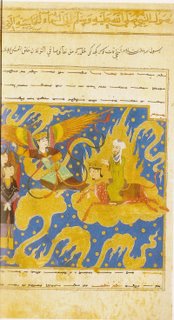Após a minha saída de Gizan, em 1986, tentei perceber até que ponto a religião era ou não fundamental para os muçulumanos.
Nas minhas leituras, encontrei em V.S. Naipaul pistas para essa reflexão. Grande parte da sua obra, nomeadamente as narrativas de viagens mas também a sua ficção, tenta reflectir sobre a vivência entre personagens de diferentes credos ( e nacionalidades ) em ambientes distintos. Os seus dois livros sobre a visita a países muçulumanos não árabes, em 1979-1981 ( "Among the Believers - an islamic journey "- edição da Picador) e em 1995-1997 ( "Beyond Belief - islamic excursions among the converted peoples " - edição da Abacus ), são notáveis.
Mas foi numa palestra sua dada no Instituto Manhattan , em Nova Iorque, em 1992, onde encontrei uma pista possível para perceber quanto a religião é fundamental para os crentes muçulumanos. Transcrevo parte :
" A large portion of Indians were Muslims; we had both had a similar nineteenth-century imperial or colonial history. I thought that religion was an accidental difference. I thought, as people said, that faith was faith, that people living at a certain time in history would have felt the same urges.
But it wasn't like that. The Muslims said that their religion was fundamental to them. And it was : it made for an immense difference. I have to stress that I was travelling in the non-Arab Muslim world. Islam began as an Arab religion; it spread as an Arab empire. In Iran, Pakistan, Malaysia, Indonesia - the countries of my itinerary - I was travelling, therefore, among people who had been converted to what was an alien faith. I was travelling among people who had to make a double adjustment - an adjustment to the European empires of the nineteenth and twentieth centuries; and an earlier adjustment to the Arab faith. You might almost say that I was among people who had been doubly colonized, doubly removed from themselves.
But it wasn't like that. The Muslims said that their religion was fundamental to them. And it was : it made for an immense difference. I have to stress that I was travelling in the non-Arab Muslim world. Islam began as an Arab religion; it spread as an Arab empire. In Iran, Pakistan, Malaysia, Indonesia - the countries of my itinerary - I was travelling, therefore, among people who had been converted to what was an alien faith. I was travelling among people who had to make a double adjustment - an adjustment to the European empires of the nineteenth and twentieth centuries; and an earlier adjustment to the Arab faith. You might almost say that I was among people who had been doubly colonized, doubly removed from themselves.
Because I was soon to discover that no colonization had been so thorough as the colonization that had come with the Arab faith. Colonized or defeated peoples can begin to distrust themselves. In the Muslim countries I am talking about this distrust had all the force of religion. It was an article of the Arab faith that everything before the faith was wrong, misguided, heretical; there was no room in the heart or mind of these believers for their pre-Mohammedan past. So ideas of history were quite different from ideas of history elsewhere; there was no wish here to go back as far as possible into the past, and to learn as much as possible about the past "
(...)
" The faith abolished the past. And when the past was abolished like this, more than an idea of history suffered. Human behavior, and ideals of good behavior, could suffer."
( Publicada no livro "The writer and the World" pela KNOPF em 2002 )
Tema a que volta mais tarde em "Beyond belief" quando na pág. 72 diz :
" The cruelty of Islamic fundamentalism is that it allows only to one people - the Arabs, the original people of the Prophet - a past, and sacred places, pilgrimages and earth reverences. These sacred Arab places have to be sacred places of all the converted peoples. Converted peoples have to strip themselves of their past; of converted peoples nothing is required but the purest faith ( if such thing can be arrived at ), Islam, submisson. It is the most uncompromising kind of imperialism."
P.S. :
1) Os destaques em negrito são meus.
2) A D. Quixote já editou em português o "Beyond Belief" com o título " Para além da graça - Digressões entre povos convertidos".
3) Imagem : "Maomé chega ao quarto céu e encontra os ajos". Miniatura extraída do Livro da Ascensão do Profeta, século XVI. Paris, BNF.









1 comentário:
Very cool design! Useful information. Go on! Insider life insurance report
Enviar um comentário